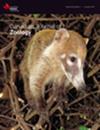Effects of bat white-nose syndrome on hibernation and swarming aggregations of bats in Ontario
IF 1.1
4区 生物学
Q3 ZOOLOGY
引用次数: 0
Abstract
Emerging infectious diseases can have substantial impacts on wildlife health, but also provide an opportunity to understand how populations respond to novel selective pressures. White-nose syndrome (WNS) has decimated some populations of bats in eastern North America, but impacts vary among species. We counted bats in 11 hibernacula in Ontario, Canada before and after WNS arrived, and compared the relative abundance of 5 bat species captured pre-WNS (1966-1968 and 2007-2009) and post-WNS (2017-2019) during swarming at one of these hibernacula. Counts of hibernating bats declined by 87-100 % after WNS arrived. However, we observed a recent, gradual increase in bat counts in the two largest, monitored hibernacula. During swarming, Myotis lucifugus (little brown bat; Le Conte, 1831) was the most frequently captured bat in all sampling periods. Capture frequency of M. septentrionalis (northern long-eared bat; Trouessart, 1897) declined precipitously after WNS arrived, while M. leibii (eastern small-footed bat; Audubon and Bachman, 1842) represented a higher proportion of bat captures in 2017-2019 compared to other sampling periods. Our data suggest potential adaptation of some bat populations to WNS, but also highlight the importance of protecting bats and their habitat during the active season to facilitate population recovery.蝙蝠白鼻综合征对安大略省蝙蝠冬眠和群集的影响
新出现的传染病可能对野生动物的健康产生重大影响,但也为了解种群如何应对新的选择性压力提供了机会。白鼻综合征(WNS)已经使北美东部的一些蝙蝠种群大量死亡,但其影响因物种而异。我们统计了WNS到来前后加拿大安大略省11个冬眠库中的蝙蝠,并比较了在其中一个冬眠库群集期间,在WNS之前(1966-1968年和2007-2009年)和之后(2017-2019年)捕获的5种蝙蝠的相对丰度。WNS到来后,冬眠蝙蝠的数量下降了87-100%。然而,我们观察到,在两个最大的、受监测的冬眠中,蝙蝠数量最近逐渐增加。在群集过程中,滑鼠(小棕色蝙蝠;Le Conte,1831)是所有采样期中捕获频率最高的蝙蝠。在WNS到来后,M.septentrisis(北方长耳蝙蝠;Trouesart,1897)的捕获频率急剧下降,而M.leibii(东部小脚蝙蝠;Audubon和Bachman,1842)在2017-2019年的蝙蝠捕获比例高于其他采样期。我们的数据表明,一些蝙蝠种群可能会适应WNS,但也强调了在活跃季节保护蝙蝠及其栖息地以促进种群恢复的重要性。
本文章由计算机程序翻译,如有差异,请以英文原文为准。
求助全文
约1分钟内获得全文
求助全文
来源期刊

Canadian Journal of Zoology
生物-动物学
CiteScore
2.40
自引率
0.00%
发文量
82
审稿时长
3 months
期刊介绍:
Published since 1929, the Canadian Journal of Zoology is a monthly journal that reports on primary research contributed by respected international scientists in the broad field of zoology, including behaviour, biochemistry and physiology, developmental biology, ecology, genetics, morphology and ultrastructure, parasitology and pathology, and systematics and evolution. It also invites experts to submit review articles on topics of current interest.
 求助内容:
求助内容: 应助结果提醒方式:
应助结果提醒方式:


